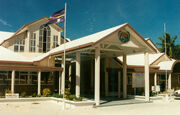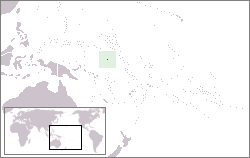| Republic of Nauru Ripublik Naoero |
||||||
|---|---|---|---|---|---|---|
|
||||||
| Motto: "God's Will First" | ||||||
| Anthem: Nauru Bwiema |
||||||
| Capital | Yaren | |||||
| Official languages | English, Nauruan | |||||
| Demonym | Nauruan | |||||
| Government | Republic | |||||
| - | Governor | Marcus Stephen | ||||
| Associate State | ||||||
| Area | ||||||
| - | Total | 21 km2 8.1 sq mi |
||||
| - | Water (%) | just the surrounding ocean | ||||
| Population | ||||||
| - | March 2009 estimate | 10,000 | ||||
| - | December 2006 census | 9,275 | ||||
| - | Density | 649/km2 1,681/sq mi |
||||
| Currency | ANZC Dollar (ANZCD) |
|||||
| Time zone | (UTC+12) | |||||
| Calling code | +674 | |||||
Nauru officially the Republic of Nauru and formerly known as Pleasant Island, is an island nation in Micronesia in the South Pacific. Its nearest neighbor is Banaba Island in Kiribati, 300 km to the east. Nauru is the world's smallest island nation, covering just 21 sq km (8.1 sq mi).
Pre-Doomsday History[]
Settled by Micronesian and Polynesian people, Nauru was annexed and claimed as a colony by the German Empire in the late 19th century. After World War I, Nauru became a League of Nations mandate administered by Australia, New Zealand, and the United Kingdom. During World War II, Nauru was occupied by Japanese troops who were bypassed by the Allied advance across the Pacific, and after the war ended, it entered into trusteeship again. Nauru was declared independent in 1968.
Throughout the first half of the 20th century, Nauru was a "rentier state". Nauru is a phosphate rock island, with deposits close to the surface, which allow for simple strip mining operations. This island was a major exporter of phosphate starting in 1907, when the Pacific Phosphate Company began mining there, through the formation of the British Phosphate Commission in 1919, and continuing after independence. This gave Nauru back full control of its minerals under the Nauru Phosphate Corporation, until the deposits ran out during the 1980s.
Doomsday & Aftermath[]
Nauru was not a target on Doomsday but was immediately cut off from the rest of the world. They survived fairly well in the time after doomsday but were still desperate to make contact with the rest of the world. After a long time they made contact with Australia who sent Nauru supplies like food and medicine.
Modern Times[]
In 1998 Nauru voted in a referendum 74%-26% in favour of becoming an associate state of the ANZC. In 2004 the ANZC Navy constructed a small naval outpost and supply depot on Nauru. At the present time the people of Nauru are faring very well but there are some elements of Nauruan society that want to cut ties with the ANZC.
Government & Politics[]
The island elects a governor and 25 representatives to the Nauru House of Commons along with 2 people to represent Nauru in the ANZC. Their governor right now is Marcus Stephen, an Independent.

The Nauru Parliament Building
The only formal political party is the Nauru First Party (NFP), a small but vocal minority of Nauruans that want political and economic ties between them and the ANZC severed immediately. However the NFP has failed to gain much traction in recent elections only securing 2 seats in the House of Commons. While their recent candidate for governor placed a distant 4th in the election.
See Also[]
| |||||||||||||||||
| ||||||||||||||||||||||




